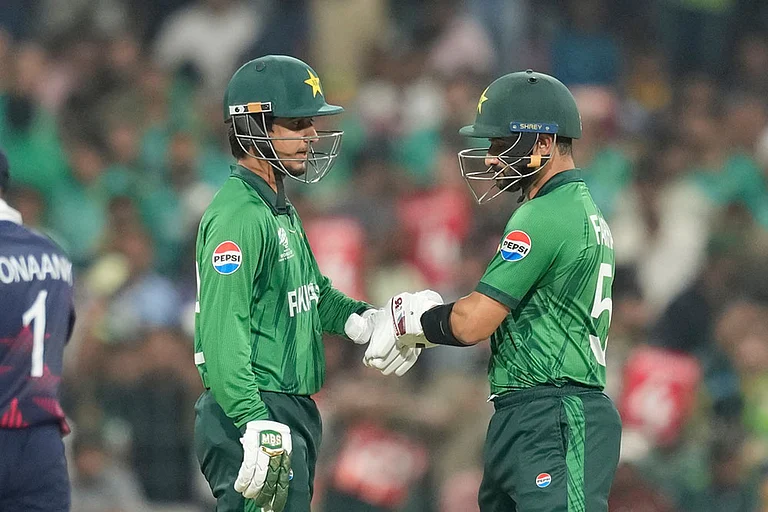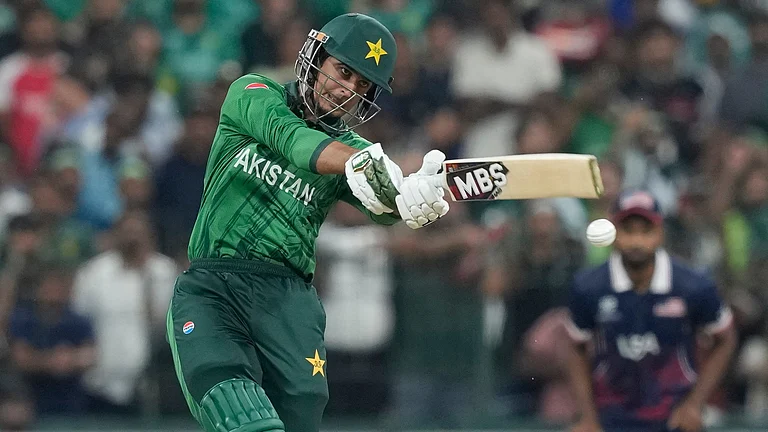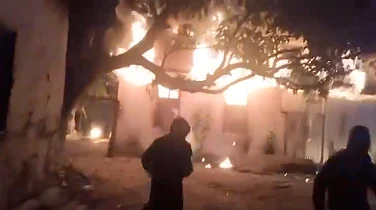For a state used to cutthroat political rivalries between larger-than-life personas—MGR versus Karunanidhi, followed by Jayalalitha versus Karunanidhi—2021 was shaping into a half-hearted scrap devoid of a doughty duel. DMK’s M.K. Stalin sat pretty, relishing the disarray in the opposite camp, confident of grabbing power after ten years.
Everything, indeed, had fallen in place for 67-year-old Stalin—a planned succession, his elder brother’s challenge snuffed out, total control of the DMK established by ensconcing seniors in top positions, while promoting son Udhayanidhi unabashedly. The DMK’s chief ministerial candidate for the 2021 assembly elections was in a happy place.
Then, the unexpected happened. The AIADMK’s rival leaders—bitterly bickering till the other day—buried the hatchet. One of them, former CM O. Panneerselvam, announced the other, current CM Edappadi K. Palaniswami (EPS), as the CM candidate. Rather than being split down the middle, the AIADMK is rallying behind one man—EPS. A steeper climb awaits Stalin.
EPS, the ‘accidental’ chief minister, had handily survived two splits—one by OPS and the other by Sasikala’s nephew T.T.V. Dhinakaran. The first he repaired by patching up with OPS, the second he tamed by reducing TTV into a bit player in the Lok Sabha election and bypolls. EPS not merely established the primacy of the AIADMK in Tamil Nadu politics, but resisted various attempts by the DMK to topple his government.
“His main success has been providing continuity in governance after Jayalalitha’s demise. EPS did this in his unobtrusive manner, without confrontation with the Centre or neighbouring states, which used to be hallmarks of Jayalalitha. Also, there are no major complaints against his government, a big plus for a party in power for ten years,” observes former TNCC president E.V.K.S. Elangovan.
Realising he can’t fit into Jayalalitha’s larger-than-life image, the AIADMK has showcased EPS as a common man’s CM—a simple, easily accessible farmer. “EPS also became a better speaker as he gained in confidence, even as Stalin was seen stumbling, referring to notes. Unlike other Dravidian leaders, EPS does not resort to flowery rhetoric but sticks to simple Tamil,” points out BJP spokesperson Narayanan.
Of course, Stalin, groomed since long to take over from his father, beats EPS on sheer charisma. His stint as mayor of Chennai and local administration minister proved to be beneficial in knowing how the levers of power work. The DMK has also sought to repackage him—a newly woven wig and clever makeup have sought to cover lines age has wrought on his face. Yet there is something artificial about his attempts to reach out—when he gingerly walked through a paddy field, one hand holding up starched veshti, during protests against the new farm bills, Stalin looked every inch a city import out of place in rural Tamil Nadu.
In contrast, when EPS folded up his veshti in half in workaday fashion, draped his towel around his neck and crouched with fellow farmers to plant rice seedlings, he blended in effortlessly—acing the photo op, if you like.
“The DMK must resist presenting Stalin as a please-all avatar. He cannot be a replica of Karunanidhi, since the DMK patriarch was a self-made man and his persona was shaped by his political philosophy. Also, Karunanidhi was a gifted speaker. Stalin instead should be marketed on his strength as a performer—like finding a solution for Chennai’s traffic and flooding problems and bringing in investments as deputy CM,” opines an industrialist.
Stalin has been more combative while taking on the Centre than in punching holes in the EPS government. “Stalin has forcefully opposed the BJP government on Hindi imposition, cultural invasion, belittling of the Tamil language and culture and encroachment of state powers. He has emerged as the protector of the state’s identity which, after the jallikattu protests, now finds traction with the youth,” points out DMK spokesperson Constantine Raveendran. A tactless BJP has also kept up a constant supply of pet fears that the DMK exploited fully. “If Stalin asserts that you will get a bank job…in Tamil Nadu only if you know Hindi, people are ready to believe him. It is a false narrative but DMK has effectively whipped up anti-BJP sentiments,” admits a state BJP leader.
On the other hand, EPS has bent backwards to please Narendra Modi’s BJP by extending support on key legislation—Article 370, CAA and the recent farm bills—even at the risk of being painted as a minion of Delhi. But EPS did keep the regional flag flying by opposing the three-language formula and NEET to counter the DMK.
But where EPS surprised even detractors was in keeping the administration ticking without being bogged down by the COVID-19 pandemic. After initial missteps, he put in place a system to contain the virus. Similarly, speedy desilting of lakes and canals endeared him to rural voters. By constantly touring the districts he kept up his visibility before the people and media too.
“The district tours helped EPS to consolidate his hold on the AIADMK, which was proven by the way he was endorsed as CM candidate. Whereas OPS buttonholed himself in his own district, EPS quietly established himself as a visible and accessible leader. It was a well-crafted move that helped EPS assert himself as the undisputed leader,” observes S. Ramesh of Thuglak magazine. The state government’s cash handouts of Rs 1,000 per family and free rice during the pandemic built on its pro-poor image too.
Where EPS succeeded but Stalin failed is in keeping their respective families in the background. One got to see EPS’s wife and son only at the “beating of plates” during the janata lockdown in March. On the other hand, Udhayanidhi showed up at every given opportunity—in person and through social media. The DMK’s vulnerability to family politics played out as Udhayanidhi and Stalin’s son-in-law Sabareesan took control of party decision-making. Come the distribution of tickets, it bodes ill for the DMK.
The EPS versus Stalin battle is also about how the two handle their allies. Unlike in the Lok Sabha elections, when Stalin could persuade some of his allies to contest on the DMK symbol, he may face resistance now. “Smaller parties like MDMK and VCK would want to contest on their own symbols to protect political identities and placate cadres. Stalin would also pare down the Congress’s seats—it won just 8 out of 41 in the 2016 elections. If the DMK had contested more seats instead of giving so many to the Congress it would have formed the government,” observes political commentator Raveenthran Thuraisamy.
The BJP has agreed to be part of the AIADMK-led alliance, but whether he really needs it is a question that will plague EPS, considering the anti-BJP mood whipped up by the DMK and the fear of losing minority votes. But since the combined power of Central and state governments can play a crucial role during elections EPS may have to carry the BJP along. That is ammunition Stalin would seize upon eagerly.
***
Stalin
Pros: Smooth succession, took effective control of party
Led alliance to big win in LS polls
Cons: Promoting family, especially son Udhayanidhi
Reduced seats could make allies unhappy
Poor communication skills
EPS
Pros: Gave stable government without major complaints
Handled pandemic reasonably well Ensured AIADMK’s pro-poor image through handouts
Cons: Seen as weak, compliant to Centre May face rebellion if sitting MLAs are denied tickets
Anti-incumbency can be a problem
By G.C. Shekhar in Chennai


























